July 5-6, 2024
ACT West Hall, Room 105
The Geometric Control and Mechanics Workshop will take place at ACT - American College of Thessaloniki. The event is addressed primarily to advanced Master students, Doctoral students and young researchers with a strong interest in the field. The workshop will consist of selected talks and offers participants a platform to share their latest results to an international audience and discuss current topics.
Topics Discussed: Geometric Control, Multi-agent control systems, Geometric Integration, Geometric Mechanics, Structural Dynamics, Robotics applications
You can download the poster of the conference here.
Registration
Register here
Deadline for registration: June 30, 2024
The registration fee is 40€, lunch and the bus from and to ACT - American College of Thessaloniki are included. A few days after registering for the workshop, you will receive an e-mail with further information on how to proceed with the payment, including where to send the information for an invoice in case you need it (remember to check the spam folder).
Deadline for submitting abstracts for talks: April 8, 2024
Deadline for submitting abstracts for posters: June 30, 2024
Send your title and abstract to This email address is being protected from spambots. You need JavaScript enabled to view it. after registering. Only a limited number of talks will be accepted. The scientific committee will select them after the deadline date.
In the event that the conference organizers manage transportation or lodging, the organizing committee will personally handle these aspects and abstain from employing the services of any travel agency.
Schedule
All presentations will be held in West Hall 105.
| |
Friday, July 5th
|
Saturday, July 6th
|
|
8:30 - 9:00
|
Registration and Opening |
|
|
9:00 - 10:00
|
Dimos Dimarogonas
|
David Martin de Diego
|
|
10:00 - 11:00
|
Dimitris Boskos
|
Rodrigo Sato
|
|
11:00 - 11:30
|
Coffee Break
|
Coffee Break
|
|
11:30 - 12:30
|
Miguel Vaquero
|
Maria Barbero
|
|
12:30 - 13:30
|
Juan Ignacio Giribet
|
Juan Carlos Marrero
|
|
13:30 - 15:00
|
Lunch
|
Lunch
|
|
15:00 - 16:00
|
Nicola Sansonetto
|
Sotirios Natsiavas
|
|
16:00 - 17:00
|
Alexandre Anahory Simoes
|
Manuel de León
|
|
17:00 - 17:30
|
Max Mendel
|
Jacob Goodman |
|
17:00 - 18:00
|
|
|
|
18:00 - 19:00
|
|
|
|
19:00 - 20:00
|
|
|
|
20:00
|
Dinner
|
|
Speakers
Click on the speaker's name to be directed to their personal website or LinkedIn profile for more information.
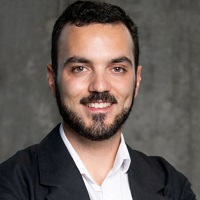 Alexandre Anahory Simoes
Alexandre Anahory Simoes
IE University, Spain
Comparison of two numerical methods for Riemannian cubic polynomials on Stiefel manifolds
In this talk, we will provide a comparison between the modified de Casteljau algorithm to approximate Riemannian cubic polynomials with a symplectic integrator associated with a Hamiltonian formulation of the same problem. We will start by briefly reviewing the standard definition of a Riemannian cubic polynomial in terms of a second-order variational problem and the necessary conditions to solve it. Then we will discuss the main challenges in approximating these families of curves in nonlinear spaces. In our way, we will present two different methods to deal with this problem: symplectic integrators and the modified de Casteljau algorithm. Finally, we will offer the audience a numerical comparison between both approaches in two illustrating examples: the two-dimensional sphere and the Stiefel manifold St_{3, 2}.
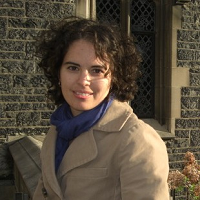 Maria Barbero
Maria Barbero
Universidad Politécnica de Madrid, Spain
Retraction maps and geometric integration I
A generalization of retraction maps called discretization maps will be presented in this talk. They are useful to obtain symplectic numerical integrators by adapting the continuous problem to the discretization rule rather than viceversa, as typically done in numerical integration. In other words, the manifold where the equations of motion live is discretized, instead of discretizing the equations. The geometric construction process guarantees the symplecticity of the method obtained. Moreover, we will show the potential of this approach to obtain numerical integrators for Lagrangian mechanical systems, including constraints, symmetries, etc.
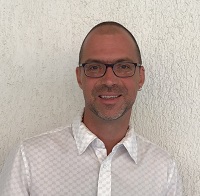 Dimitris Boskos
Dimitris Boskos
Delft University of Technology, The Netherlands
Data-driven distributionally robust coverage control
In this talk, we present a data-driven coverage control algorithm, which optimally deploys a team of robots across a spatial region where a random event of interest may occur. The probability density of this event is unknown and can only be inferred to some extent from data. To hedge against this distributional uncertainty, we present a data-driven ambiguity set construction, which contains plausible models of the unknown density and enjoys rigorous probabilistic guarantees. Using this set, we design a distributionally robust algorithm that optimizes the locations of the robots against the worst-case probability density from it. This leads to a non-smooth, non-convex optimization problem, which we solve by an appropriate variant the Gradient Sampling algorithm. We finally present conditions under which the algorithm is guaranteed to converge and elaborate on why these are met in our problem setting.
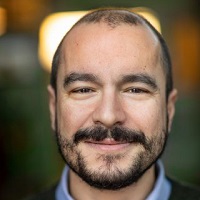 Dimos Dimarogonas
Dimos Dimarogonas
KTH Royal Institute of Technology, Sweden
Spatiotemporal logic control for heterogeneous multi-agent systems
Formal methods-based planning and control is an established methodology for autonomous systems that are subject to high level tasks. When it comes to multi-agent systems, recent trends involve objectives which are quantified in space and time in the form of Signal Temporal Logic (STL) formulas and its variations. However, in most cases the agents are considered homogeneous with respect to their dynamics, sensing and communication constraints and actuation limitations. In this talk, we consider the problem of control synthesis for heterogeneous multi-agent systems under STL tasks, including the case of leader-follower networks where an agent subgroup of leaders are responsible for the control objective fulfillment of the whole group. We start by presenting transient controllers for heterogeneous networks and under simple control objectives such as consensus and formation control, and we then use these controllers as bases for more general multi-agent tasks given by STL. We finally consider the potential discrepancies between the task dependency and communication graphs, and propose the means on how to account for such discrepancy in the control design.
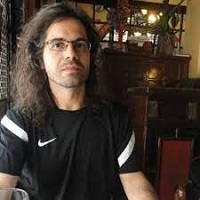 Juan Ignacio Giribet
Juan Ignacio Giribet
University of San Andrés - CONICET, Argentina
Clifford algebras and its applications to navigation and control
The aim of this talk is to highlight the utility of Clifford algebras in solving various robotics problems, focusing on their application in the development of navigation algorithms for autonomous vehicles and coordinated control of robot formations. In the first part of the presentation, the relationship between Clifford algebras and key mathematical concepts such as quaternions, dual quaternions, and displacements will be explored. Through concrete examples, it will be demonstrated how these algebras allow symbolic manipulations of these mathematical objects and how their application can contribute to problem-solving in robotics control. A fundamental element that will be addressed is how this mathematical formalism facilitates coherent and unified manipulation of common geometric objects, such as linear spaces, spheres, and displacements, within a single framework. This coherence is essential for improving the understanding and control of mobile robots, as well as for achieving effective coordination in robot formations. Additionally, the talk will present concrete examples of applications in mobile robotics currently being developed in our group, illustrating practically how Clifford algebras are becoming an essential tool in the evolution of modern robotics.
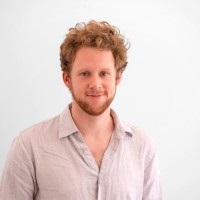 Jacob Goodman
Jacob Goodman
Antonio de Nebrija University, Spain
Obstacle Avoidance Problems on Riemannian Manifolds
In this talk, I discuss obstacle avoidance on Riemannian manifolds via the design of artificial potential functions. Two major strategies will be presented: The use of artificial potentials as a device to modify a given variational principle, and their use in modifying the underlying manifold geometry. In both cases, conditions are derived which allow for safety guarantees in the obstacle avoidance task, and classes of functions are provided which satisfy said conditions. The special case in which the underlying manifold is a Lie group with a bi-invariant Riemannian metric is presented, where simplified conditions are obtained. Connections to optimal control problems in robotic systems are discussed, and simulations are provided for region avoiding geodesics on SO(3).
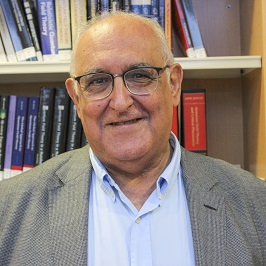 Manuel de León
Manuel de León
Spanish National Research Council (CSIC), Spain
Nonholonomic brackets
In this talk we will first introduce nonholonomic mechanical systems, both in their usual symplectic formulation and in the contact formulation, considering in the latter case systems with friction in addition to constraints. In both cases we will construct in a very simple way the corresponding nonholonomic brackets, almost Poisson in the first case and almost Jacobi in the second. The construction of these brackets opens the way for a quantization procedure for these systems.
 Juan Carlos Marrero
Juan Carlos Marrero
University of La Laguna, Spain
Retraction maps and geometric integration II
A discretization map is a natural generalization of the classical definition of a retraction map. This notion was introduced very recently by Barbero-Liñán and Martı́n de Diego (2022) and applications in geometric integration of this object will be discussed in a previous talk by Barbero-Liñán. In my talk, I will present an extension of the notion of a discretization map to the more general setting of Lie groupoids and algebroids. Then, I will show that this definition is useful to obtain geometric integrators for the reduction of standard symmetric Hamiltonian systems. In particular, such integrators preserve the (Lie) Poisson structure associated with the reduced Hamiltonian system. The results presented in this talk are part of a work in progress in collaboration with M Barbero-Liñán and D Martı́n de Diego.
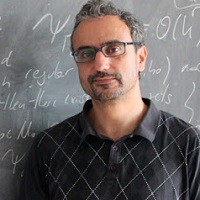 David Martin de Diego
David Martin de Diego
Institute of Mathematical Sciences (ICMAT), Spain
Completeness of Riemannian Metrics and Applications to Control of Mechanical Systems
In this talk , we will introduce a mathematical technique based on the modification of a given Riemannian metric, namely the kinetic energy of a Lagrangian system, to a complete Riemannian metric using classical results of Riemannian geometry. This technique is aimed at controlling and stabilizing controlled mechanical systems which by construction efficiently avoid given regions or obstacles.
 Max Mendel
Max Mendel
Delft University of Technology, Netherlands
Differential Geometry, Analytical Mechanics, and Economics
In this talk I intend to demonstrate that the application of the modern differential-geometric formulation of Lagrangian mechanics to economics is both natural and intuitive. I will show that the tangent bundle provides the consumer demand perspective, while the cotangent bundle provides the firm's pricing perspective. Hamilton's principle determines the utility-maximizing course of action, with the Euler-Lagrange equations prescribing how the price level adjusts to scarcity. Traders are properly described using the extended tangent bundle of the Hamilton-Jacobi method. That description allows us to incorporate the dynamics of the economic surplus (energy) and market friction (damping) in a canonical fashion. This insight leads to a canonical method for incorporating damping in mechanical systems, a new result in Lagrangian mechanics.
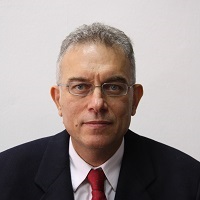 Sotirios Natsiavas
Sotirios Natsiavas
Aristotle University of Thessaloniki, Greece
Dynamics of constrained multibody systems based on a natural ODE formulation
A class of multibody dynamic systems, involving bilateral motion constraints, is examined. Such constraints arise frequently in modeling dynamics of a plethora of engineering systems and need special treatment. First, the Analytical Dynamics framework is adopted and the basic theoretical ingredients of a method leading to an appropriate set of equations of motion are presented. More specifically, this new set is derived by application of Newton’s second law and appears as a coupled system of strongly nonlinear second order ordinary differential equations in both the generalized coordinates and the Lagrange multipliers associated to the motion constraints. This is achieved by treating the motion constraints as an integral part of the overall analytical process. Then, this set is put in an appropriate weak form and a suitable numerical discretization scheme is developed, respecting the geometric properties of the configuration space. Furthermore, the position, velocity and momentum type quantities are subsequently treated as independent. This yields a three-field set of equations of motion, which is then used as a basis for performing a suitable temporal discretization, yielding a complete time integration scheme. This scheme is also capable of handling cases involving redundant constraints and singular positions, through a proper extension to an augmented Lagrangian form. Finally, the accuracy and efficiency of the new numerical scheme are demonstrated by examining a selected set of mechanical examples, including benchmark problems. A comparison with classical numerical schemes, based on equations of motion expressed as sets of differential–algebraic equations, is also performed.
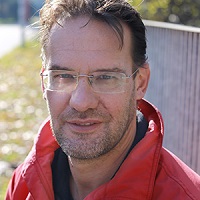 Nicola Sansonetto
Nicola Sansonetto
University of Verona, Italy
Path planning via a Dynamic Moving Primitive approach to the obstacle avoidance problem
In this talk we will consider obstacle avoidance for Dynamic Movement Primitives (DMPs). We propose a framework for obstacle avoidance based on superquadric potential functions to represent volumes, and then extend it to include the velocity of the system in the definition of the potential. Our formulations guarantee smoother behaviour with respect to state-of-the-art point-like methods, moreover, they allow obtaining a smoother behaviour in proximity of the obstacle than when using a static (i.e. velocity independent) potential. We validate our framework for obstacle avoidance in a simulated multi-robot scenario and with different real robots: a pick- and-place task for an industrial manipulator and a surgical robot to show scalability; and navigation with a mobile robot in a dynamic environment. Finally some recent results on the DMPs approach outside the euclidean set up will be outlined.
 Rodrigo Sato
Rodrigo Sato
Friedrich-Alexander-Universität Erlangen-Nürnberg, Germany
A new Lagrangian approach to regular control-affine mechanical systems
Sufficiently regular optimal control problems can be handled variationally. By taking variations of an augmented cost function one can obtain the first order necessary conditions for optimality. In this talk, we will introduce a new Lagrangian approach to codify this augmented cost function in the particular case of control of mechanical systems, where the plant can be described by a system of second order differential equations. This allows us to obtain the optimality conditions as Euler-Lagrange equations, use Noether's theorem and directly apply the discrete Lagrangian formalism to discretize the problem. This is joint work with S. Leyendecker, S. Maslovskaya, S. Ober-Blöbaum and F. O. Szemenyei.
 Miguel Vaquero
Miguel Vaquero
IE University, Spain
Primal-Dual Dynamics for Data-Driven Optimization
Primal-dual, or saddle-flow dynamics, has been intensively used for constrained optimization, primarily due to its remarkable properties regarding scalability and robustness. However, its study has largely been confined to the convex setting. In this talk, we will discuss how to regularize primal-dual dynamics to address time-dependent non-convex problems. We will also provide applications to traffic control.
Committees
Organizing Committee
Efstratios Stratoglou, ACT - American College of Thessaloniki, Universidad Politécnica de Madrid (UPM)
Leonardo Colombo, Spanish National Research Council (CSIC), Centre for Automation and Robotics (CAR)
Evaggelos Chatzistavrou, ACT - American College of Thessaloniki
Vasilis Daskalogiannis, ACT - American College of Thessaloniki, Aristotle University of Thessaloniki (AUTH)
Emmanouil Maou, ACT - American College of Thessaloniki
Scientific Committee
Antony Bloch is the Alexander Ziwet Collegiate Professor of Mathematics at the University of Michigan. His research interests are in mechanics and nonlinear control, Hamiltonian systems and integrable systems, and related areas of nonlinear dynamics.
Leonardo Colombo is a Tenured Scientist (Científico Titular) of the Spanish National Research Council (CSIC) at the Centre for Automation and Robotics (CAR). His research interests are in geometric mechanics, control theory, robot motion planning, modeling and analysis of complex control systems.
David Martin de Diego is a research scientist at the Instituto de Ciencias Matemáticas – ICMAT (Institute of Mathematical Sciences). His work focuses on applications of Geometric mechanics in a wide range of topics such as geometric integrators, nonholonomic mechanics, Hamilton-Jacobi equation, optimal control theory, reduction of lagrangian systems.
Travel and Accommodation
How to reach us
ACT - The American College of Thessaloniki is located at 17 Sevenidi st., 55535, Pylaia, Greece. The workshop will take place at West Hall room 105. For the participants there will be a bus for the transportation to/from the campus (for the itinerary see below*).
Accommodation
There are many options in the city for accommodation. We propose the hotel below, which has a special offer for the workshop participants until April 10th.
- Metropolitan Hotel Thessaloniki, Vasilissis Olgas Ave 65 - Fleming, 546 42, Thessaloníki, Macedonia, Greece T: +30 2310824221, F: +30 2310849762, email: This email address is being protected from spambots. You need JavaScript enabled to view it.
Metropolitan Hotel Offer:
Classic Single: 76 euro/day (breakfast Included) + 7 euro per day City Tax
Classic Double: 84 euro/day (breakfast Included) + 7 euro per day City Tax
The workshop’s reservation code for the above offer, will be mailed by the organizing committee, immediately following registration.
*The transfer bus will depart from the hotel above at 8:00 am on Friday and at 8:30 on Saturday. In case you would like to choose an alternative accommodation, you should go to the departing spot or to ACT using public transportation and/or Taxi.
For more information
If you have any further questions, please contact This email address is being protected from spambots. You need JavaScript enabled to view it..
More













 Alexandre Anahory Simoes
Alexandre Anahory Simoes Maria Barbero
Maria Barbero Dimitris Boskos
Dimitris Boskos Dimos Dimarogonas
Dimos Dimarogonas Juan Ignacio Giribet
Juan Ignacio Giribet Jacob Goodman
Jacob Goodman Manuel de León
Manuel de León Juan Carlos Marrero
Juan Carlos Marrero David Martin de Diego
David Martin de Diego Max Mendel
Max Mendel Sotirios Natsiavas
Sotirios Natsiavas Nicola Sansonetto
Nicola Sansonetto Rodrigo Sato
Rodrigo Sato  Miguel Vaquero
Miguel Vaquero


